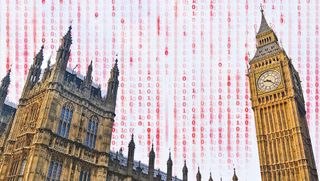Open Rights Group calls for government to protect data post-Brexit
ORG warns UK government not to let US push it into weaker data protection laws

Brexit can't be allowed to reduce data protection for British citizens, the Open Right Group (ORG) has argued in a letter sent to MPs to mark Data Protection Day.
When the UK exits the European Union on Friday, it will be free to set its own data protection rules, though it will have to ensure enough protection is in place to allow European data to continue to be shared with the UK.
The digital activists at ORG warned that data protection in the UK is under threat, citing news reports suggesting the government wants to shift away from European privacy standards.
"However, moving away from European data protection and accepting weak US-style privacy laws would mean accepting very low standards and undermining trust in the technology, finance and health sectors," ORG said in a statement.
The ORG warned that companies and the US government can be expected to apply pressure to lower standards, in particular around insurance, bank credit agencies, the internet and healthcare.
"The likelihood of a loose trade agreement with the EU will mean the UK will come under pressure to dilute data privacy standards, especially to allow US companies to access UK markets without high levels of data protection," the ORG added.

Your guide to overcoming Brexit's data management challenges
Understand Brexit and the data law modifications it may cause
The letter calls for the government to continue to apply strong data protection across all industries and to not allow trade agreements to dilute or circumvent existing data regulations.
Get the ITPro. daily newsletter
Receive our latest news, industry updates, featured resources and more. Sign up today to receive our FREE report on AI cyber crime & security - newly updated for 2024.
"The signs from government are unclear: as the future trade agreement is likely to be loose, it would be open to government to dilute data protection, to make it harder to enforce, or to lower fines," noted the letter, written by ORG executive director Jim Killock.
Reducing data protection could be detrimental to the technology sector, especially if weak laws mean British companies find it harder to access European markets. Plus, Britain needs tight data protection to ensure continued sharing of information with European agencies — an area already under threat.
"It is clear that divergence or lowering standards could make it harder for Europol and the UK to share information about criminals," the letter explained.
Brexit security talks under threat after UK accused of illegally copying Schengen data Netherlands raises concerns on UK data adequacy after EU database copying incident GDPR and Brexit: How will one affect the other? UK-US post-Brexit data flow agreement could water down regulation standards ICO myth-busts on the flow of data post Brexit
Killock adds that data protection matters to the Brits the MPs are supposed to represent, pointing to European research that suggests 73% of people in the UK were concerned about not having control of their data online.
"Now that we are facing an uncertain future it is more important than ever for the United Kingdom to commit to respecting the right to privacy," Killock adds.
Most Popular





